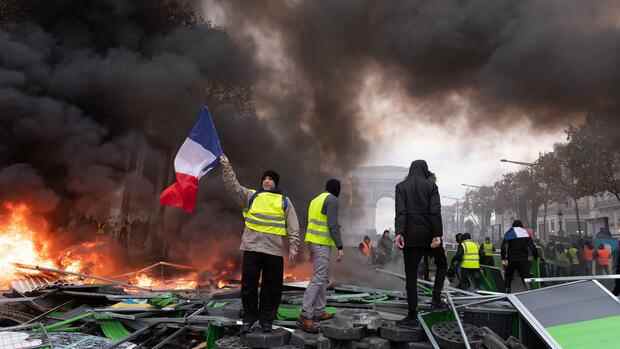It’s about energy and purchasing power, but also about the planned reforms of unemployment insurance and pension insurance. France’s media are already outdoing each other with gloomy prophecies. It is feared that inflation in particular could trigger a massive “yellow vest protest movement 4.0”.
Already on vacation, Macron swore the French to “accept paying the price of freedom”. He called for efforts from them and announced that economic and social issues would dominate politics in the autumn.
The fall will show how much leeway Macron still has in his second term in office. The basic conditions are modest. Having lost the absolute majority in the National Assembly, he only has a relative majority. The question is whether he will be able to push through the planned reforms to reduce unemployment and government debt.
Top jobs of the day
Find the best jobs now and
be notified by email.
One of his main areas of concern is unemployment insurance, the conversion of which is intended to save money on the one hand and to find jobs more effectively on the other. It is planned to adjust unemployment benefits to the economic situation. Although the details are still unknown, unions are already protesting the project.
Reform: Resistance expected
The reform of pension insurance, which is due to come into force in the summer of 2023, also promises heated debates. Resistance is programmed, trade unions and the Left and Greens in Parliament are already mobilizing.
Not only the two major reform projects contain social explosives. Inflation, particularly in energy and food, will also pose challenges for the government. In order to support purchasing power, a package worth more than 20 billion euros was approved in the summer, including discounts on fuel, bonuses for the new school year, increases in social security benefits, discounts on gas and electricity, and tax breaks for overtime.
But France’s media such as “Le Monde” ask whether the package is enough to make the French compliant. Gasoline prices have fallen, but inflation hit 6.1 percent in July. “That’s lower than that of our European neighbors,” the Ministry of Economic Affairs and Finance said reassuringly. But the gradual difference should not give the government a bonus.
>> Read here: Emmanuel Macron – A man who prefers to be in the front row
“The pressure on the government is stronger than ever,” said Brice Teinturier, deputy director of the Ipsos research institute. He observed a widespread unwillingness among the French to make sacrifices and conserve energy. After the Covid crisis, the French do not want to accept any more hardship.
dichotomy between the wealthy and the disadvantaged
The potential for excitement about political issues in France is traditionally high, especially in the autumn when the president reveals his medium-term plans. The last major protests were the strikes against Macron’s planned pension reform. They lasted from December 2019 to February 2020 and were only stifled by the pandemic and the lockdowns that followed.
The protests by the so-called yellow vests from November 2018 to spring 2019 were particularly violent. They initially flared up due to a planned fuel tax, but then grew into extensive social demands. Although the fuel tax was withdrawn, otherwise little has changed in society.
The stark division of France into the wealthy and the disadvantaged has remained. Expensive energy prices and inflation are likely to hit the underprivileged particularly hard, further fueling social conflict.
In addition, the measures to strengthen purchasing power should expire at the end of 2022. The government put together the huge package to avoid unrest in the fall. But should gas and gasoline prices continue to rise, it would be risky to let the programs end at the end of the year. Should inflation be less high in 2023, aid is only planned for the poorest in society, according to Economics Minister Bruno Le Maire.
After his summer vacation, Macron is getting back into the political business.
(Photo: Reuters)
The Left and Greens (Nupes) in Parliament, in particular, don’t think much of temporary checks and bonuses anyway. They’re asking for a raise. However, the Republic is currently a long way from that.
>> Read here: “Get along without Russian gas” – Macron swears in the French
In the private sector, wages increased by just 1 percent in the second quarter, which cannot even offset inflation. After all, a pension increase of four percent was decided in the summer, and a surcharge of 3.5 percent was approved for the salaries of state employees.
Macron as crisis manager
Like the left in parliament, the unions believe that temporary bonuses are not enough. And they can rely on left-wing politician Jean-Luc Mélénchon, who is planning a “march against the expensive life” at the beginning of October.
The popular anger programmed there meets the budget negotiations for 2023, which pose a particular challenge for Macron. While leftists are demanding more money, conservative Republicans are threatening to block his plans.
They are concerned with reducing government spending after France has already spent more than 40 billion euros on supporting purchasing power this year. Macron will have to prove his qualities as a crisis manager more than ever – inside parliament and on the harsh reality of the streets. Political observers are certain that if he fails, his second term in office could turn into a nightmare.
More: The greatest lessons from the French election


